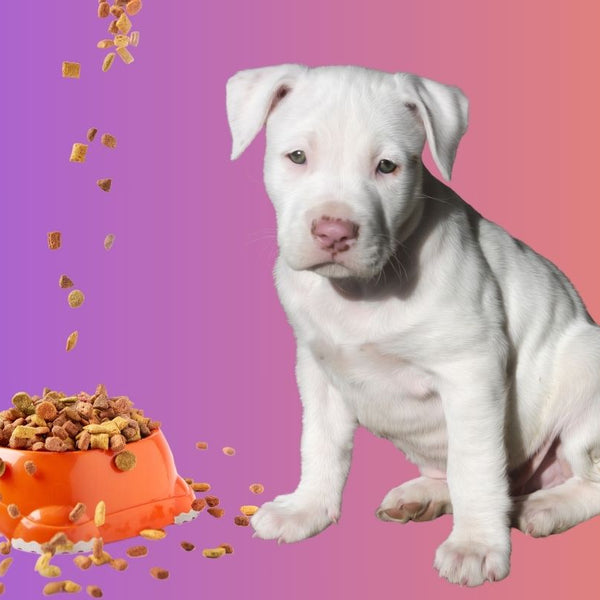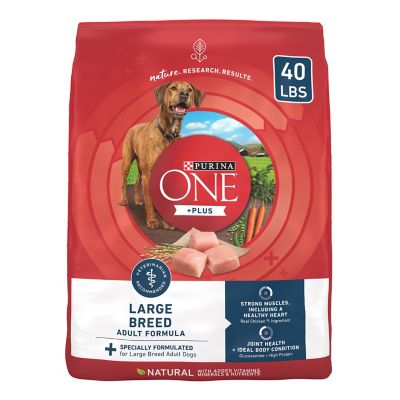When it comes to feeding your Pitbull, choosing the right dog food is essential for their health and happiness. You want to ensure that your furry friend gets the best nutrition possible to thrive.
But with so many options on the market, it can be overwhelming to find the perfect fit for your dog’s unique needs. You’ll discover the best dog food for Pitbulls, tailored specifically to their nutritional requirements. We’ll explore ingredients to look for, brands that stand out, and tips to keep your dog healthy and energetic.
By the end, you’ll have all the information you need to make an informed choice that will benefit your beloved companion. Let’s dive in and find the ideal food that will make your Pitbull wag their tail with joy!

Credit: shop.bullymax.com
Nutritional Needs Of Pitbulls
Understanding the nutritional needs of Pitbulls is crucial for their health and well-being. These dogs are muscular and active, requiring a balanced diet to support their energy levels and maintain their strength. Choosing the right dog food can significantly impact their growth, behavior, and overall happiness.
Nutritional Components Of Pitbull Diets
Pitbulls thrive on a diet rich in protein. Look for dog foods that list high-quality meat as the first ingredient. Aim for at least 20-30% protein to fuel their active lifestyle.
Healthy fats are equally important. They provide energy and support skin and coat health. Ingredients like fish oil and chicken fat can be beneficial. Aim for around 8-15% fat content in their food.
Essential Vitamins And Minerals
Your Pitbull’s diet should include essential vitamins and minerals. These nutrients support their immune system, bone health, and overall vitality. Key vitamins include A, D, E, and B-complex vitamins.
Calcium and phosphorus are crucial for strong bones. A balanced ratio of these minerals helps prevent skeletal issues. Look for foods that list these nutrients in the ingredient list.
Hydration And Its Importance
Don’t underestimate the importance of water. Always ensure your Pitbull has access to fresh water. Proper hydration aids in digestion and helps maintain energy levels.
Consider adding wet food to their diet. This can increase their water intake and provide additional nutrients. It also makes mealtime more enjoyable for them!
Common Dietary Issues
Some Pitbulls may face food sensitivities or allergies. Be attentive to any changes in their behavior or health after introducing new foods. Common allergens include grains, chicken, and beef.
If you notice signs of discomfort, consult your veterinarian. They can recommend hypoallergenic diets tailored to your dog’s needs.
Choosing The Right Dog Food
With so many options available, how do you choose the best food for your Pitbull? Look for brands that prioritize high-quality ingredients. Avoid foods with fillers like corn or soy.
Consider your dog’s age, weight, and activity level. Puppies have different nutritional needs compared to adult or senior Pitbulls. Tailor their diet to ensure they receive the right balance of nutrients.
Lastly, don’t forget to monitor their weight and adjust their food intake accordingly. Regular vet check-ups can help you stay on track with your Pitbull’s dietary needs.
Key Ingredients To Look For
Choosing the right dog food for Pitbulls is essential. Quality ingredients help maintain their health and energy. Some ingredients are more beneficial than others. Here are key ingredients to look for in dog food.
High-quality Protein Sources
Protein is vital for Pitbulls. It supports muscle growth and repair. Look for meat as the first ingredient. Chicken, beef, or fish are great options. They provide essential amino acids. Avoid foods with meat by-products.
Healthy Fats
Healthy fats support skin and coat health. Omega-3 and Omega-6 fatty acids are important. They help reduce inflammation and promote a shiny coat. Sources include fish oil and flaxseed. Check the label for these ingredients.
Fruits And Vegetables
Fruits and vegetables add vitamins and minerals. They boost the immune system. Blueberries, sweet potatoes, and carrots are great choices. These ingredients improve digestion and overall health. Always choose foods with real fruits and veggies.
Whole Grains
Whole grains provide energy and fiber. Brown rice and oatmeal are excellent options. They help with digestion and keep your dog full. Avoid dog foods with too many fillers. Fillers can lead to unhealthy weight gain.
Probiotics And Prebiotics
Probiotics and prebiotics support gut health. They help with digestion and nutrient absorption. Look for these ingredients in the food. They can improve your dog’s overall well-being. A healthy gut leads to a happy dog.
Ingredients To Avoid
Certain ingredients can harm your Pitbull’s health. Avoid foods with artificial colors, fillers, and excessive grains. Look for high-quality protein sources. Stay clear of by-products and low-grade meats for better nutrition. Choose wisely to keep your dog strong and healthy.
Choosing the right dog food for your Pitbull is critical for their health and well-being. Just as important as knowing what to feed them is understanding what to avoid. Certain ingredients can harm your dog’s digestive system, skin, or overall health. Here’s a look at some of the ingredients you should steer clear of when selecting food for your Pitbull.Artificial Preservatives
Artificial preservatives like BHA, BHT, and ethoxyquin can be harmful. These chemicals are often used to extend shelf life but may lead to health issues over time. Opt for dog food that uses natural preservatives, such as vitamin E or rosemary extract.Fillers
Fillers, such as corn, wheat, and soy, provide little nutritional value. They often lead to weight gain and can trigger allergies in some dogs. Check the ingredient list carefully; if these fillers are among the top ingredients, consider another option.By-products
Animal by-products can be a red flag. They often include low-quality parts of the animal that are not suitable for human consumption. Instead, look for whole meats listed as the primary ingredient to ensure your Pitbull gets the best nutrition.Excessive Grains
While some grains can be beneficial, excessive grains can lead to obesity and other health issues. Many dogs, including Pitbulls, thrive on a high-protein, low-carb diet. If you see grains dominating the ingredient list, it’s time to rethink your choice.Sugars And Sweeteners
Sugar and sweeteners, like corn syrup and cane sugar, are not healthy for your dog. They can lead to weight gain and dental issues. Look for foods that do not list sugar in any form among the first few ingredients.High Salt Content
High salt levels can be detrimental, leading to increased thirst and potential kidney problems. Dog food that contains salt as a primary ingredient should be avoided. Your dog’s diet should be balanced, with minimal salt added.Meat Meals
While meat meals may sound good, they can be misleading. They often lack the nutrients found in whole meats and may include low-quality sources. Choose dog food that clearly lists the type of meat used, ensuring it’s a quality source of protein. Reading labels can feel overwhelming, but it’s essential. Your Pitbull deserves the best nutrition you can provide. What ingredients have you found to be surprising or concerning in pet foods? Share your insights and experiences.
Credit: www.sparkpaws.com
Dry Dog Food Options
Choosing the right dry dog food for your Pitbull can significantly impact their overall health and vitality. With so many options available, it’s essential to select a formula that meets their unique nutritional needs. Let’s dive into two popular categories: high-protein formulas and grain-free choices.
High-protein Formulas
Pitbulls are muscular dogs that thrive on a diet rich in protein. High-protein formulas typically contain meat as the primary ingredient, providing the essential amino acids necessary for muscle development and maintenance.
- Blue Buffalo Wilderness: This formula boasts real chicken as the first ingredient and contains 34% protein. It’s grain-free and packed with antioxidants.
- Taste of the Wild High Prairie: Featuring roasted bison and roasted venison, this food offers 32% protein. It also includes sweet potatoes and peas for healthy carbohydrates.
- Orijen Original Dry Dog Food: With 38% protein, this formula includes fresh, free-run chicken and turkey. It’s designed to mimic a natural canine diet.
Have you noticed how much energy your Pitbull has after a meal? A high-protein diet can lead to increased stamina and enthusiasm, perfect for those long walks or play sessions.
Grain-free Choices
Some Pitbulls can be sensitive to grains, making grain-free options a great choice. These formulas often rely on alternative carbohydrate sources like sweet potatoes and peas, providing energy without the potential digestive issues.
- Merrick Grain-Free Texas Beef & Sweet Potato: This food has 38% protein and uses real deboned beef as the first ingredient.
- Canidae PURE Limited Ingredient: With 32% protein and only eight key ingredients, it’s perfect for dogs with food sensitivities.
- Wellness CORE Grain-Free: This formula offers 34% protein and includes a blend of high-quality animal proteins.
Have you tried switching to a grain-free option? Many dog owners report improved digestion and a shinier coat after making this change.
Choosing the right dry dog food can make a world of difference in your Pitbull’s health and happiness. Pay attention to their energy levels and overall well-being to find the best fit for your furry friend.
Wet Dog Food Options
Wet dog food options are great for Pitbulls. They provide moisture and taste. Many dogs enjoy the rich flavors. This makes wet food a favorite for picky eaters. Finding the right wet food is important. It should meet your Pitbull’s needs. Let’s explore some of the best options available.
Best For Picky Eaters
Pitbulls can be fussy about their food. Wet dog food often wins their hearts. Look for options with real meat as the first ingredient. This ensures high-quality protein. Also, consider flavors like chicken, beef, or lamb. These tastes are usually more appealing.
Some brands offer variety packs. This allows you to test different flavors. It helps find what your dog loves. Check for added vitamins and minerals. These nutrients support their health.
Balanced Nutritional Blends
Choose wet dog food with balanced nutrition. Pitbulls need a mix of protein, fats, and carbs. Look for options that provide this balance. Foods with vegetables and grains can be beneficial. They add fiber and support digestion.
Brands that focus on whole ingredients are ideal. Avoid those with fillers and artificial flavors. Quality ingredients lead to healthier dogs. Always read the label to ensure quality.
Wet food can also be mixed with dry food. This can enhance taste and texture. It encourages your Pitbull to eat well. Healthy eating leads to a happy, active dog.

Credit: www.tractorsupply.com
Raw And Homemade Diets
Choosing a raw or homemade diet for your Pitbull can be rewarding. These diets may improve health and energy. They allow you to control ingredients. You know exactly what your dog eats.
Benefits Of Raw Feeding
Raw feeding offers many benefits for Pitbulls. It can lead to healthier skin and coat. Raw diets often include fresh meats and bones. This helps with dental health by reducing plaque.
Raw foods can increase energy levels. Many owners notice better digestion and fewer allergies. Dogs may enjoy the taste of raw meals more than kibble.
Raw diets can also promote lean muscle mass. This is crucial for active breeds like Pitbulls. A balanced raw diet supports overall health and vitality.
Homemade Meal Ideas
Making homemade meals for your Pitbull can be simple. Start with lean meats like chicken, turkey, or beef. Add vegetables like carrots, peas, and sweet potatoes.
Rice or oats can be good starch sources. Mix in healthy fats like fish oil for omega-3s. Avoid harmful foods such as onions, garlic, and chocolate.
Consider preparing a big batch and storing leftovers. This saves time and ensures fresh meals. Always consult a vet before changing your dog’s diet.
Puppy-specific Nutrition
Puppy-specific nutrition is vital for growing Pitbulls. Choosing the right dog food supports their health and development. Look for options rich in protein, vitamins, and minerals to keep them strong and active. Proper nutrition helps build muscle and maintain energy levels in these energetic pups.
Puppy-specific nutrition is crucial for the healthy growth and development of your Pitbull. Puppies have unique dietary needs that differ from those of adult dogs. Providing the right nutrients ensures they grow strong and maintain a healthy weight.Growth-boosting Foods
Choosing the right food for your Pitbull puppy can set the foundation for a lifetime of health. Look for high-quality puppy food that lists real meat as the first ingredient. Consider these essential nutrients:- Protein: It supports muscle growth. Aim for foods with at least 22% protein.
- Fat: Healthy fats provide energy. Look for a fat content of around 8-15%.
- Calcium and Phosphorus: These minerals are vital for bone development. An ideal ratio is approximately 1.2 parts calcium to 1 part phosphorus.
Transitioning To Adult Food
As your Pitbull matures, transitioning to adult food is essential. Typically, this change happens around 12 to 18 months of age. Gradual shifts help avoid digestive upset. Start by mixing a small amount of adult food with their puppy food. Increase the adult food portion over a week or two. Watch for these signs to determine if it’s time to switch:- Your puppy has reached their adult weight.
- They no longer seem to be gaining weight.
- Behavioral changes indicate they need more energy or nutrition.
Senior Pitbull Diet Needs
Senior Pitbulls have special diet needs. Their bodies change as they age. Nutrition plays a key role in their health. It helps them stay active and feel good. Choosing the right food is important. Focus on their weight, joints, and overall health.
Low-calorie Options
Weight management is crucial for older Pitbulls. They can gain weight easily. Look for low-calorie dog food. It helps maintain a healthy weight. Foods with fewer calories help in reducing fat. High-quality protein sources are still important. They keep muscles strong. Check the label for portion sizes.
Joint Health Support
Senior Pitbulls often face joint issues. Support their joint health with proper nutrition. Look for food with glucosamine and chondroitin. These ingredients help keep joints healthy. Omega-3 fatty acids are also beneficial. They reduce inflammation and improve mobility. A balanced diet supports overall joint function.
Special Diets For Allergies
Pitbulls can have food allergies. These allergies may cause skin issues or digestive problems. Finding the right food is important for their health. Special diets help manage these allergies. Two popular options are hypoallergenic dog foods and limited ingredient diets.
Hypoallergenic Dog Foods
Hypoallergenic dog foods are designed for sensitive dogs. They contain fewer allergens. These foods often use novel protein sources. Common examples include duck or venison. They avoid common allergens like beef and chicken.
Many brands offer hypoallergenic options. Look for foods labeled as such. Check the ingredient list carefully. This helps avoid ingredients that can trigger allergies. Always consult your vet before changing your dog’s diet.
Limited Ingredient Diets
Limited ingredient diets focus on simplicity. They contain fewer ingredients overall. This helps identify food allergies. These diets often use a single protein source and a few carbs.
Limited ingredient diets are easier to digest. They reduce the risk of allergic reactions. Brands often use sweet potatoes or peas as carbs. Choose a diet that suits your dog’s needs. Again, consult your vet for guidance.
Tips For Choosing The Right Food
Choosing the right food for your Pitbull is important. This breed needs balanced nutrition. The right food helps keep them healthy and strong. Follow these tips to find the best options.
Reading Labels
Start by reading the food label carefully. Look for high-quality ingredients. Meat should be the first ingredient listed. Avoid foods with fillers like corn and soy.
Check for essential nutrients. Pitbulls need proteins, fats, vitamins, and minerals. Ensure the food meets AAFCO standards for complete nutrition.
Consulting A Veterinarian
Consult your veterinarian before choosing dog food. They know your dog’s health needs. Your vet can recommend specific brands or formulas.
Consider your Pitbull’s age, weight, and activity level. Puppies, adults, and seniors have different needs. Your vet can guide you in making the best choice.
Frequently Asked Questions
What Is The Best Food For Pitbulls?
The best food for Pitbulls is high in protein and healthy fats. Look for options specifically formulated for large breeds. Ingredients should include real meat, whole grains, and vegetables. Avoid fillers and artificial additives to ensure a balanced diet for your Pitbull’s health.
How Much Should I Feed My Pitbull?
Feeding guidelines vary by age, weight, and activity level. Generally, adult Pitbulls need 2 to 3 cups of high-quality food daily. Split this into two meals to prevent bloating. Consult your veterinarian for personalized recommendations based on your dog’s specific needs and lifestyle.
Can Pitbulls Eat Grain-free Food?
Yes, Pitbulls can eat grain-free food, but it’s not necessary. Some dogs may benefit from grain-free diets if they have allergies. However, whole grains provide essential nutrients and fiber. Always consult your veterinarian before making significant changes to your dog’s diet.
Are There Specific Nutrients Pitbulls Need?
Pitbulls require protein, healthy fats, vitamins, and minerals for optimal health. Protein supports muscle growth, while fats provide energy. Essential vitamins and minerals help maintain overall well-being. A balanced diet ensures your Pitbull stays active and healthy throughout its life.
Conclusion
Choosing the best dog food for Pitbulls is essential. A good diet helps keep them healthy and strong. Look for food with high protein and good fats. Always check the ingredients. Avoid fillers and artificial additives. Regular vet visits are important too.
They can help with specific needs. Remember, every dog is unique. Pay attention to your Pitbull’s preferences and health. A good diet leads to a happy, active dog. Take time to find the right food. Your Pitbull deserves the best.

